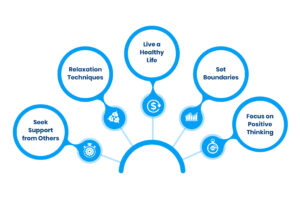Do you feel that stress is hurting your well-being and health? Toxic stress, which is a highly serious type of chronic stress, may have long-term effects, both on the body and mind. In contrast to normal stress, which may be coped with, the toxic stress arises when a person experiences continuous pressure or trauma without the support systems to handle the pressure. It may be as a result of abuse, neglect, financial strain, or being in a hostile environment. Toxic stress may impair the development of the brain, emotional control, and even physical well-being over time. It is important to identify and deal with toxic stress as soon as possible to avoid permanent harm. In this article, we will discuss the effects of toxic stress on people and the ways to cope with it to live a more balanced, healthy life.
What Is Toxic Stress?
Toxic stress is a form of stress that occurs when one encounters continuous difficulty or problems without adequate support or assistance to get through. It may happen when an individual repeatedly goes through such things as abuse, neglect, and other unpleasant experiences over a long time. Toxic stress is different from regular stress; it uses the body and the brain to damage them in case it is prolonged. Such stress has the potential to influence the health of individuals, making them susceptible to diseases and mental problems.
Additionally, toxic stress influences the development of emotions and social lives of people. As an example, it can alter the manner in which a child learns and develops relations with others. It may also complicate the control of emotions and the positive attitude of the adults. This, in its turn, may cause continuous problems in life, whether in personal relations or working performance. Thus, it is critical to identify toxic stress at the first stages and work with it to decrease the negative outcomes.
Toxic Stress in Children: Symptoms
The following are some of the symptoms of toxic stress:
- Difficulty in attention or concentration.
- Worry or nervousness is often felt.
- Erratic mood swings or anger.
- Social isolation of peers or family.
- Poor sleeping or uncommon nightmares.
- Complaints of physical pain, such as headaches.
- Being outspoken or throwing tantrums.
- Alterations in food intake or eating habits.
- Poor performance at school or no interest in school.
- Inability to trust others or establish relationships.
Signs of toxic stress in adults
The signs for toxic stress in adults include:
- Unrelenting anxiety or worry.
- Inability to focus or to decide.
- Greater irritation or frustration.
- Difficulty sleeping or insomnia.
- Excessive fatigue or listlessness.
- Slower work or everyday performance.
- Feelings of desperation or overpowering.
Toxic Stress Examples
Examples of toxic stress include:
- Long-term abuse or neglect.
- Constant bullying or harassment.
- Living in a dysfunctional or insecure household.
- Dealing with financial hardships or being poor.
- Experiencing a long-term divorce or family dispute.
- Regular exposure to violence or traumatic events.
- Exposure to social injustice or discrimination.
- Looking after an ill or incapacitated relative inadequately.
- Difficulty with job insecurity or incessant job stress.
Toxic Stress in Children
Toxic stress in children occurs when they are exposed to ongoing stressors, such as child abuse, neglect, or residing in a volatile environment. This kind of pressure may damage the development of a child, in particular, without providing them with sufficient support or warmth. To illustrate, children who undergo toxic stress might struggle to regulate their emotions, which can influence their behavior and relationships with others.
Besides, stress that is toxic may be long-lasting in the health and well-being of a child. It may make them hard to concentrate in school, establish healthy relationships, or even good coping skills. Consequently, children who undergo toxic stress can have mental health problems, including anxiety or depression, in adulthood.
Types of Stressors Affect Your Mental Health
Work-Related Stressors
One of the most frequent causes of difficulties in mental health is work-related stressors. They may encompass the long working hours, the pressure, or the demanding working conditions. As an example, a stressful work schedule with strict deadlines may cause burnout. Besides, conflicts or inadequate support at workplaces may elevate the stress levels, making it difficult to cope with day-to-day activities.
Relationship Stressors
Interpersonal bonds, such as those with family, friends, or partners, may also lead to mental health problems. Consequently, stress might accumulate with time, which impacts the capacity to experience emotional calmness or affiliation with others. As a result, such a form of stress can be a cause of loneliness or anxiety.
Financial Stressors
Another significant stressor that may have a substantial impact on mental health is financial problems. It can cause worry knowing that one is struggling with debt, has lost their job, or is living paycheck to paycheck. Financial stress, in its turn, may lead to anxiety and even depression.
Environmental Stressors
Factors in the environment, like residing in a high-noise or violence-prone environment, may influence mental health. In addition, exposure to natural disasters or severe weather patterns can also lead to the development of extra stress and powerlessness.
Health-Related Stressors
Stress may be a chronic disease or injury and may impact the body and mind. A long-term health condition may be frustrating, frightening, or difficult to deal with. In turn, it may cause mental health problems, as a person may feel that they cannot control their health or that they do not know how they will be in the future.
What Types of Stressors Can Lead to Toxic Stress?
Different forms of stressors may cause toxic stress, particularly those that are accompanied by a lack of sufficient support and are long-lasting. To illustrate, children brought up in abusive or neglectful settings tend to develop toxic stress more. Stress lasting long enough without relief or assistance may begin to damage the brain and body. Likewise, economic hardship or residing in an unsafe, unstable locality may cause permanent stress, and it becomes more difficult to manage.
Furthermore, in case a person has a constant health issue that is not addressed with the appropriate emotional support, it may amplify their stress levels. Also, work-related stress, particularly when it is persistent and overwhelming, might add to toxic stress. Thus, it is essential to detect these stress factors at a young age and offer support to avoid the detrimental effects in the long term.
Effects Of Stress on Child Development
Stress can affect the development of a child a lot, particularly when the child is subjected to it for a considerable duration. Stressed children might struggle to learn, nurture relationships, or even manage their emotions. To illustrate, stress may be a factor in the child not being able to concentrate at school, an issue that may not advance them in school.
This amount of continuous pressure may eventually alter how the brain of a child grows, and one may be less likely to cope with the obstacles that they may be facing in the future. The consequences of stress on childhood development may manifest themselves in several ways:
- Emotional tussles: Stress may cause anxiety, depression, or anger problems.
- Behavioral issues: The children may become erratic or fail to discipline their impulses.
- Social problems: Children may find it more difficult to build constructive relationships with other people.
- Physical health problems: Chronic stress may lead to headaches, stomachaches, or other physical effects.
- Problems with learning: Stress can prevent children from focusing and performing well in school.
Tips For Toxic Stress Response

1. Seek Support from Others
Seeking support is one of the most significant actions in the process of dealing with toxic stress. Conversing with a close friend, family member, or professional may be over-comforting and enlightening. In addition, the support system will help in alleviating the feeling of isolation and make them feel connected, and therefore, stress is easily handled.
2. Relaxation Techniques
Besides seeking support, relaxation techniques would help reduce stress. Deep breathing, meditation, or yoga can also help relax the body and mind. Consequently, consistent use of those methods may enhance general health and be more efficient in dealing with stress.
3. Live a Healthy Life
A healthy lifestyle is very important in mitigating the impact of toxic stress. Physical and mental health can be boosted by eating well-balanced food, exercising, and sleeping. As an example, an exercise routine can elevate the mood level and energy, which can help better cope with everyday stresses.
4. Set Boundaries
Another important technique of managing toxic stress is setting limits. When to say no is an important consideration in order to guard your time and energy. Demarcating your role will help you not to assume too much responsibility and diminish the sense of being overwhelmed.
5. Focus on Positive Thinking
It is possible to begin thinking about positive things to alter your attitude towards stressful circumstances. With negative thoughts, it is possible to restructure them into positive ones with the help of identifying and counteracting negative thoughts. This change can help you find stressors easier to deal with and increase your overall emotional endurance.
Final Thoughts
In conclusion, toxic stress can have a lasting impact on both children and adults, affecting emotional, physical, and mental well-being. Early detection of the signs and assistance should help to cope with stress. Through a good support system, relaxation methods, a healthy lifestyle, boundary setting, and the ability to think positively, people can help mitigate the ill effects of toxic stress. Mental health should be given priority, and a supportive and understanding environment should be developed. By using the correct strategies, one can defeat stress and develop resilience that results in a healthier, more balanced life.
The current actions can create a brighter and less stressful future. At MAVA Behavioral Health, we treat anxiety using medications and provide personalized care to deal with the symptoms. Having both short-term relief and a long-term wellness approach, we are able to offer full support in managing anxiety.
FAQs
What is toxic stress?
Toxic stress happens when an individual is exposed to chronic stress, and there is a lack of support or resources to handle it. It may occur due to such aspects as abuse, neglect, or an unsafe environment, and it may harm both mental and physical conditions.
What is the impact of toxic stress on the development of a child?
Toxic stress may disrupt the child in his capability to learn, control emotions, and develop relationships. It may also affect the development of the brain, and in later stages of life, one can have problems in school and mental health issues.
How does toxic stress affect the development of a child?
Toxic stress can disrupt a child’s brain development, affecting their ability to learn and regulate emotions. It can lead to behavioral problems, such as anxiety or aggression, and hinder their social skills.
What should I do to deal with stress?
As a way of coping with stress, one of the techniques that can be adopted is deep breathing, meditation, physical exercises, and healthy boundaries. A support system among friends or professionals can also be helpful to relieve stress and avert mental health problems.
What are the reasons that I need professional help with stress?
When your stress is overwhelming, and when it is impacting your day-to-day life, and when it is leading to either physical or emotional discomfort, then you should seek professional assistance. A counselor or therapist can offer stress coping strategies and support for your mental health.









